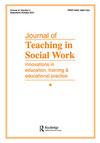Challenging Anti-Black Racism in HBSE: Using Critical Race Theory to Interrogate Traditional Developmental Paradigms
IF 0.9
Q3 EDUCATION & EDUCATIONAL RESEARCH
引用次数: 1
Abstract
ABSTRACT How do we challenge anti-Black racism within the social work curriculum? As a requirement of all BSW and MSW programs, Human Behavior and the Social Environment (HBSE) coursework provides students with foundational knowledge about human development that is essential to theory-driven social work practice. Traditionally, conceptions of human development center the experiences of white, heterosexual, cis-gender young people and label other identities as “divergent” or “diverse,” thereby devaluing the lived experiences of marginalized populations and reducing disparities to a misjudged application of “equal opportunity.” Centering the tenets of critical race theory (CRT) within HBSE course curricula enables us to examine the impact of race and racism upon human development and to challenge anti-Black racism. This article will expand commonly used frameworks (e.g., ecological systems theory, life course theory) to consider how CRT helps us understand the impact of race and racism on human development, and specifically on the development of Black youth. We explore recent frameworks that center Black youth’s experiences and highlight the impact of racial stress and trauma on development from infancy to adolescence. Five social work educators of an MSW HBSE course offer examples of class activities and assignments that enabled students to apply CRT to HBSE topics.挑战HBSE中的反黑人种族主义:用批判种族理论质疑传统的发展范式
我们如何在社会工作课程中挑战反黑人种族主义?作为所有BSW和MSW计划的要求,人类行为和社会环境(HBSE)课程为学生提供有关人类发展的基础知识,这对于理论驱动的社会工作实践至关重要。传统上,人类发展的概念以白人、异性恋、顺性年轻人的经历为中心,并将其他身份贴上“不同”或“多样化”的标签,从而贬低了边缘化人群的生活经历,并将差异缩小为对“机会平等”的错误应用。将批判种族理论(CRT)的原则集中在HBSE课程中,使我们能够研究种族和种族主义对人类发展的影响,并挑战反黑人种族主义。本文将扩展常用的框架(例如,生态系统理论,生命历程理论)来考虑CRT如何帮助我们理解种族和种族主义对人类发展的影响,特别是对黑人青年发展的影响。我们探索了以黑人青年经历为中心的最新框架,并强调了种族压力和创伤对婴儿期到青春期发展的影响。五位城市生活垃圾HBSE课程的社会工作教育工作者提供了课堂活动和作业的例子,使学生能够将CRT应用于HBSE主题。
本文章由计算机程序翻译,如有差异,请以英文原文为准。
求助全文
约1分钟内获得全文
求助全文
来源期刊

Journal of Teaching in Social Work
EDUCATION & EDUCATIONAL RESEARCH-
CiteScore
1.20
自引率
0.00%
发文量
36
期刊介绍:
The Journal of Teaching in Social Work fills a long-standing gap in the social work literature by providing opportunities for creative and able teachers—in schools, agency-based training programs, and direct practice—to share with their colleagues what experience and systematic study has taught them about successful teaching. Through articles focusing on the teacher, the teaching process, and new contexts of teaching, the journal is an essential forum for teaching and learning processes and the factors affecting their quality. The journal recognizes that all social work practitioners who wish to teach (whatever their specialty) should know the philosophies of teaching and learning as well as educational methods and techniques.
 求助内容:
求助内容: 应助结果提醒方式:
应助结果提醒方式:


